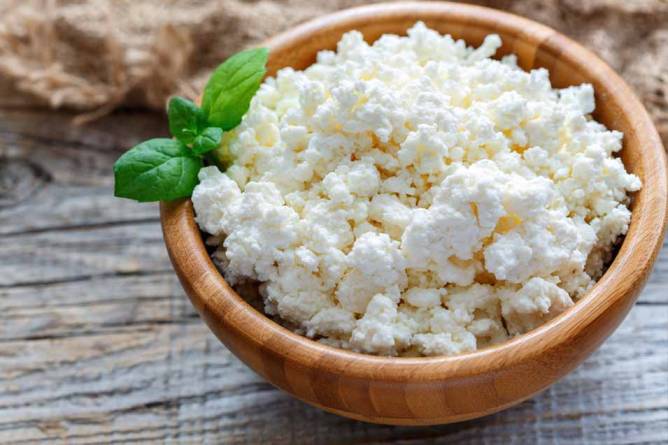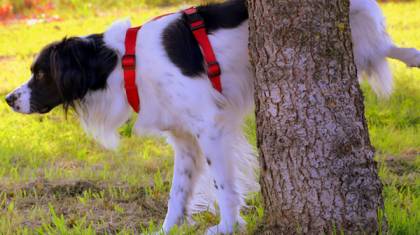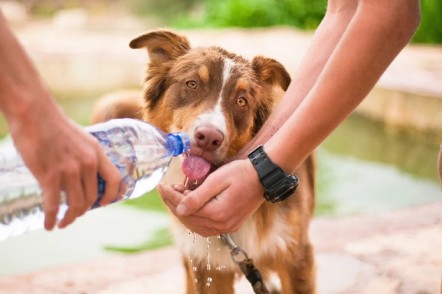Connect with a verified veterinarian in minutes. Licensed vets are available 24/7 to answer your questions. No need to worry about your furry family member.
Cottage cheese is used across a wide variety of recipes! And why not? It’s yummy! Plus, it’s low in calories and has a mild flavor. And it’s often recommended as part of a healthy diet for us. But what about our doggies and puppies? Can they eat cottage cheese?
What is Cottage Cheese?
Cottage cheese is soft, white and creamy. It’s the part of the cheese that doesn’t go into the aging or ripening process as do other types of cheese. Cottage cheese also has a mild flavor, which means it goes with everything.
Cottage cheese is made from the curds of cow’s milk. Dog owners may have noticed there are different sizes of curd including small, medium, and large. Plus, it’s available as creamed, lactose-free, reduced sodium, sodium-free, and whipped.
Did you know that cottage cheese is really good for you? The reason is that’s filled with plenty of nutrients. These include phosphorous, vitamin B12, selenium, riboflavin, calcium, folate, vitamin B6, zinc, and copper.
Because it’s extremely healthy and has a mild flavor, cottage cheese can be used in all types of recipes including:
- Salads
- Pancakes & waffles (use instead of milk)
- Fruit
- Granola
- Dipping sauces
- Smoothies
- Baked goods
- Mayonnaise substitute
- Scrambled eggs
- Lasagna
This is a very versatile, healthy ingredient!
Cottage Cheese is known as a complete protein. This means that it has all nine essential amino acids which are needed for the formation of proteins in the body. It is also important to note that it contains all the essential fatty acids and calcium as well.
What are the health benefits of cottage cheese?
The following are some of the most important health benefits of cottage cheese:
1. Cottage Cheese is a complete protein which means that it contains all nine essential amino acids. These are required for the formation of proteins in the body. The other types of proteins that are not essential are the conditionally essential amino acids which are those that cannot be produced by the body and so they must be obtained from the diet.
2. Cottage Cheese is a low-fat dairy product. It is not very rich in fat content and is a good source of protein.
3. Cottage Cheese contains many essential minerals such as calcium, phosphorus, magnesium, potassium and sodium which are needed for the proper functioning of the body.
4. Cottage Cheese has been found to have an anticarcinogenic effect due to its content of vitamin A
5. Cottage Cheese is an excellent source of vitamins A, B6, B12 and E.
6. Cottage Cheese contains probiotics which have an effect on the digestive system.
7. Cottage Cheese contains many enzymes and hormones which are necessary for the proper functioning of the body.

Review symptoms, medications & behavior to keep your pets healthy with a Vet Online in just minutes.
Ask a Vet Live NowCan Dogs Eat Cottage Cheese?
Is cottage cheese good for dogs?
Yes! Puppies, small dogs, and adult dogs can safely eat cottage cheese. In fact, it’s a healthy snack for them if the puppy is on a balanced diet. If your dog eats cottage cheese without other dog food, he will get hungry very quickly. You can give him a small piece of cheese as an occasional treat, but it’s best to avoid giving him too much. The calories in cottage cheese can add up quickly. If you’re feeding your dog cottage cheese as a meal, mix it with some meat or another source of protein such as eggs.
Carbohydrates are the body’s source of energy. The liver converts these carbohydrates into glucose which is used by the body as a source of energy. It is also an important nutrient that provides a number of important functions in the body such as transporting oxygen to the cells, helping in muscle contraction and acting as a neurotransmitter. It is also known to be essential for maintaining bone health.
Dogs need more protein than they do carbs, so it is recommended that they consume a high protein instead of high carbs or high fat diet. Protein is the building block of muscle, bones and skin. It is also essential for energy production and metabolism. Dogs also need fat in their diet, as this provides them with energy and also helps to make sure that they are functioning at their optimum level.
Some digestive issues can occur when dogs are fed a high protein diet. It is therefore important to find a protein source that can be digested easily and quickly. Cottage cheese is an excellent source of protein, as it is easy to digest and provides the body with all the essential amino acids that it needs.
Cottage cheese can be fed to dogs of all ages, but it is best fed to puppies who are starting their protein intake. It is recommended that they consume this food at around 6 months of age.
How much cottage cheese should I feed my dog?
If you are feeding your dog cottage cheese as a meal, it’s best to give him one teaspoon per ten pounds of body weight. This will provide your dog with about five ounces of cottage cheese. You can mix it with some meat or another source of protein for a complete meal.
Giving him a large amount of cottage cheese can cause an upset stomach and lead to other health problems such as diarrhea or constipation. You should always check with your vet before giving your dog any type of food that he may not be used to eating regularly.
Obesity is a major health problem that is affecting many people and their pets. To prevent your dog from becoming overweight, it is best to feed him a balanced diet that contains all the essential nutrients he needs. Dietary fat should be included in his diet. Dogs need a certain amount of fat to maintain their weight. Cottage cheese is a good source of dietary fat for dogs.
Cottage cheese is also rich in protein, which can be very beneficial for your dog’s health. Protein is important for your dog’s immune system and helps to keep his bones strong and healthy. Cottage cheese also contains calcium, which can help your dog develop strong bones and teeth.
You should also take note that pancreatitis is a common disease that can affect dogs. Pancreatitis is an inflammation of the pancreas. Dogs with pancreatitis can experience vomiting, diarrhea, and abdominal pain.
There are many benefits to feeding your dog cottage cheese, but you should always check with your vet before giving him any type of food that he may not be used to eating regularly.
Cottage cheese is basically human food and has a very mild flavor, so it’s ideal for dogs. It can be used as a dog treat, but it should not be fed on a regular basis. This low-fat cheese is also used as a nutritional supplement. It is a great source of protein and calcium.
For first time owners, it is very important to remember that this product is not for dogs with food allergies. The same goes for dogs that are lactose intolerant. A less lactose intolerant dog may be able to eat it, but it is not recommended.
Your dog’s stomach can handle cottage cheese if you mix it with some yogurt or add it to your dog’s dry food. However, it is not recommended to feed it on its own. It should be used as a supplement.
What About Lactose Intolerance?
It is possible that some puppies will be lactose intolerant. Lactose is a type of sugar found particularly in dairy products. In most people (and pooch), lactose is broken down by the body. The substance that breaks down lactose in the body is called lactase.
If a puppy is lactose intolerant, it means the puppy’s body isn’t able to properly break down the lactose. The puppy doesn’t have enough lactase in his system, then he will be lactose intolerant.
Dogs, in general, don’t produce much lactase in their bodies. Puppies have a higher level of lactase in their system just before they reach the weaning phase. Once past this point, though, dogs will have lower amounts of lactase as they age.
So, in general, most puppies should be able to safely enjoy cottage cheese! It’s best to begin gradually introducing cottage cheese to a puppy’s diet.
You might start out by giving them a bite or two, no more. Then monitor your puppy for any symptoms that indicate he’s lactose intolerant. You may notice symptoms such as diarrhea and/or bloating. However, if the puppy seems OK, then you can slowly go ahead and add a little more cottage cheese to your puppy’s diet.
Just be sure to monitor your puppy and watch for any concerning symptoms. If you note any type of reaction, then stop the cottage cheese immediately and let the vet know. And remember, cottage cheese should be no more than 10% of your dog’s diet.
Connect with a verified veterinarian in minutes. Licensed vets are available 24/7 to answer your questions. No need to worry about your furry family member.

Julie
Julie is a graduate of the University of North Carolina, Wilmington, where she studied Animal science. Though contrary to the opinion of her parents she was meant to study pharmacy, but she was in love with animals especially cats. Julie currently works in an animal research institute (NGO) in California and loves spending quality time with her little cat. She has the passion for making research about animals, how they survive, their way of life among others and publishes it. Julie is also happily married with two kids.
Review symptoms, medications & behavior to keep your pets healthy with a Vet Online in just minutes.
Ask a Vet Live Now




